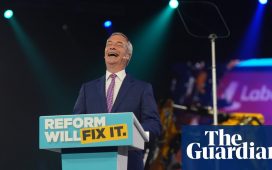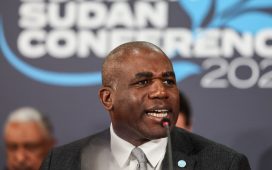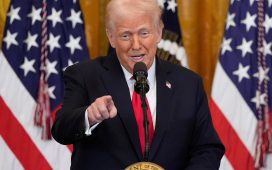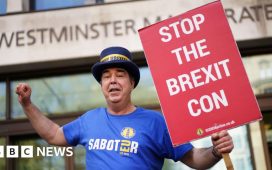Two months on from the Tories’ worst election result in its history, none of its prospective leadership candidates inspire confidence in a fast bounce-back. Research by More in Common found that 70% of the public either didn’t know who could win the next election for the Tories, or thought none of them could. James Cleverly, second place in Wednesday’s vote among MPs, did best: 8% of respondents believed he could turn things round. Results are starkest for Mel Stride (still in the contest by the skin of his teeth): 1% of general voters and 1% of 2024 Conservative voters polled think he stands a chance. Priti Patel is now out of the race, but Tom Tugendhat, Kemi Badenoch and Robert Jenrick all hover around 5% of general voters, perhaps reflecting the fact they’ve done little to distinguish themselves from one another – instead chasing the same fervid, anti-immigrant dreamscape. But surely the worst finding is that voters are starting to find the party “weird”.
It’s a word that’s been deployed to devastating effect in the US, where Tim Walz detonates it folksily against Donald Trump and the entire Republican party. “That stuff is weird. They come across weird,” he said. It is a line he has repeated in slightly different iterations across the pre-campaign trail. Walz could be talking about anything: Trump’s rambling speeches, or his hair, or the spectacle of a billionaire blatantly fighting for the interests of capital with grand, pugnacious rhetoric about the working man. It’s all weird. A poster doing the rounds on social media reads: “We’re not perfect, but they’re nuts! Vote Democrat”. It’s close, but it’s no bullseye: often the Republican stance is perfectly sane, in the sense that self-interest is sane and seeking victory is sane. But it’s still, objectively, weird.
The Conservative leadership candidates also come off as weird, for their obsessive focus on things no one else is talking about: leaving the European convention on human rights; a cap on migrants (and whose cap is the lowest); the scourge of woke. Things were different when, in government, they set the agenda – like it or loathe it, when they talked about culture wars, they were at least dancing to their own tune. Now they’re still doing that quite frantic dance to a different tune, it comes off as still loathsome – but also plain weird.
The word is a circuit breaker, it resets the debate. It’s very difficult to come back from, as evidenced by Donald Trump’s pitiful response to Walz: “I’m not weird, he is.” But if the Tories want to de-weird themselves, they have to consider how they got so weird in the first place.
This, as far as I can tell, is the chronology. The electorate, mediated and understood through polling, wanted probity and competence but then voted for Boris Johnson. We never got another chance to vote, en masse, for a Tory leader, but both Liz Truss and Rishi Sunak represented a sort of kit-car version of preferences inferred from the popularity of Johnson. Truss shared his messianic, hang-the-consequences, evidence-be-damned self-belief; but that, it transpired, was weird. Actions do have consequences; Truss was not the Messiah. Sunak was no more than the last man standing, but was attempting to be a man of the people while actually being richer than the king. It was not dishonest, as such, but it was incredibly weird to watch.
Much of the Tories’ rhetorical weirdness – the new generation’s tough talk on migration and the culture wars – is a reheated version of the early post-Brexit years. The analysis of that result centred on the question: how did the nation get so angry, and why did nobody notice? Brexiter Conservatives, high on victory, found the fault in an amorphous “metropolitan elite”, who might be a supreme court judge or a leftwing activist using a food bank who happened to live in London. But the world has moved on now and quite a lot else has happened; people are angry for different reasons. But, for the Tory candidates, the liberal elite are like reds under the bed: the spectre always remains, regardless of how little traction it gains with the public. They doubtless all know that it isn’t working, but are stuck trying to create a brand from lines that worked in the past.
In the best possible case scenario – Cleverly and Patel – it adds up to a persona, but it doesn’t add up to a person. In the middle – Badenoch and Tugendhat – it looks aerated and cynical (respectively). In the worst case, Jenrick’s, the word that came up in the polling was “slimy”, which conveys both a quality of obsequiousness and the way he slips through your fingers. It is impossible to know who he is, or what he really thinks.
In passing, Tory-to-Lib Dem switchers explained that “Ed Davey’s party just seemed more ‘normal’”. It’s easy to understand why. Davey had a plausible argument about a real thing that people understood (social care), as opposed to an existential crusade about something you can’t even discuss without a pre-debate on whether it means anything (a war on woke).
This is all to say that the Tory candidates have ended up miles from where the electorate is currently situated, to land somewhere, well, extremely weird. I’m in no tearing hurry to see them recover: sure, all governments need an opposition to keep them sane – but I’m happy to watch a normal person do it for a bit.











